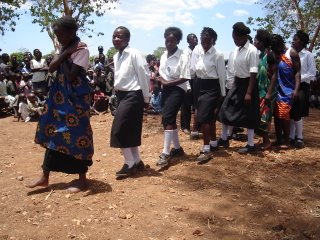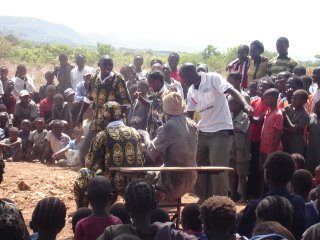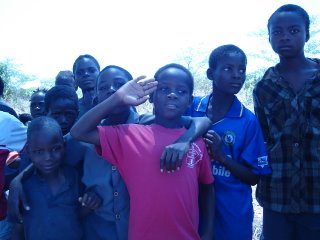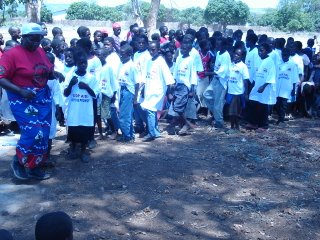
16th October 2006
We fly back to Zambia today. The mercury has climbed some way since we left and we have worked up a good sweat by the time we have dragged our rucksacks off the baggage carousel. The city centre seems very subdued compared to how it was when we were leaving two weeks ago, as the much disputed election results were announced. At that time there were some street protests and reports of tear gas being fired off, and for a very brief moment, it had all seemed quite exciting. Now, there is no obvious sign of dissent anywhere. Everyone has clearly resigned themselves to another five years of the incumbent president. Mwanawasa is a man of no great charisma or vision, but all the same, he’s probably a better choice than the slightly alarming opposition candidate who had been tipped for the job.
We meet up with Joost, who is in town for the day, and we catch up on the news as we drive back to Mpanshya. The hospital has taken delivery of the long-promised CD4 counter, which would be great news if it wasn’t for the fact that we need another piece of equipment in order to use it, and no one knows if or when we are likely to receive it. Joost’s bridge building project is going well, but he is worried about the forthcoming rainy season which may derail his construction if it arrives early. And more ominously, the predicted post-election gas shortages have now happened, so our days of access to refrigeration may be numbered.
It is dark by the time we reach Mpanshya, and we unlock the door to our airless house. The insects are out to welcome us, and they seem to have increased in size considerably during the last fortnight. Despite that, it’s good to be back again. South Africa was lovely, but Zambia is home, for now anyway.
31st October 2006
Chas has managed to persuade World Vision to give us a donation of assorted items which they call Gifts in Kind. After many delays, Chas finally brings his haul of goodies home. The back of the van is stuffed with boxes, and Bernadette and I help him unload them. Our living room is piled high with clothes, nurses’ uniforms, medical equipment and toys, all for Mpanshya.
1st November 2006
Bernadette and I are setting up the clinic in the Catholic church in Lukwipa. My office for the day is behind the altar, while Bernadette stands at the front organising the patients’ files, looking as if she’s about to read the lesson. We have two visitors from JICA, the Japanese development agency – they are trying to assist the district health board with improving access to ARV drugs, and they want to see how our outreach service is working. I chat with one of them, and he tells me he’s just completed three years in Afghanistan where he worked on the national TB programme. Being observed at work by someone with this level of expertise is more than a little intimidating, and I reluctantly invite him and his colleague to sit in on the clinic. The patients are delighted however; both men are wielding expensive-looking cameras, and they willingly pose while being examined.
When we finish (twenty patients and many, many photos later) we go off to visit one of our patients at home with Odester and Mathilda. Andrew was crawling on the floor when Beatrice brought him to hospital a few months back; initially we weren’t certain why, but now we are sure he has cancer, with secondary tumours in his spine. He was discharged in a borrowed wheelchair two months ago, but home is a fifteen minute walk from the road, and his wife is struggling to cope. He cries when he sees us. It takes a long time to persuade him to come to hospital again but eventually he agrees. All we have to do now is get him to the car. He is not a heavy man, but carrying him in his wheelchair over rough ground involves some hard work for us, and considerable discomfort and indignity for him. Eventually we get back to the vehicle, and together, we collapse in a heap at the roadside. Better not to be poor and disabled in Zambia. If your legs stop working here, you’re invisible.
When we come back to the hospital, we find that the distribution of the Gifts in Kind is already underway, under the supervision of Sister Sabina. Several male inpatients are proudly modelling the donated ladies’ blouses. The hospice care givers have never had uniforms for work before, but today they are resplendent in blue polyester. I compliment Mathilda on her workwear, and she beams. “Mr Charles
agwira nchito [has done well]. Our own clothes will be resting now.”
2nd November 2006
Our fridge packed up over a week ago, and now its only practical use is displaying the Nelson Mandela magnet that Chas brought back from holiday. All the shopping gets mouldy and ant-infested within a couple of days, and the water comes out of the tap scalding hot. So, today we make an African fridge. I buy some earthenware pots from one of the patients, and we fill them with food and then swathe them in damp tea towels. The idea is that the water slowly evaporates and draws out the heat. Unlike every other physics experiment I ever tried, this one actually works, and we sit outside in the evening heat sipping cool water. My dad would surely have approved.
4th November 2006
There are small signs that you have been out in the bush too long. For example, when you hear a car going past, and you get up and look out of the window to see who it is. Tonight there is a new one. We are watching a DVD at home when suddenly we hear something drumming on the asbestos roof. It is the first rain in months. We go out into the rain with our hands outstretched, upturned, laughing at our own surprise.
23rd November 2006
The hospital is deserted at the moment. Everyone is cultivating, nobody has time for illness. Mother roll their eyes when I tell them that their children need to stay for a few more days, muttering about
kulima. My morning ward round is finished by ten thirty. I am idly wondering what I might do next, when Sister Regina says, in her usual vague manner “There is a patient…just arrived, in the side room…pregnant”. I pick up my stethoscope and am moving towards the door when she adds “…and she’s having a fit.”
Hoping that she is somehow mistaken, I walk to the side room. Christine is lying on the bed, bloated and unconscious. Three elderly relatives begin talking at me simultaneously, miming a seizure. As if to reinforce the point, Christine begins to shake violently. I manage to get a line in and give her some diazepam, trying desperately to recall what the textbooks say about eclampsia. (Later, I look it up. They say: Avoid using diazepam.)
I confer with Sister Valeria. After my last near disaster, I have weaselled out of operative obstetrics and referred everyone who needs a section to Lusaka. I try suggesting this again. She frowns back at me. She is right; what this woman needs right now is not a two hour transit on the floor of a Landcruiser.
So, I find myself back in theatre. The anaesthetic doesn’t work properly, and the patient keeps moving while we’re trying to get the baby out. A bit like War and Peace, minus the cannon fire. But they survive, Christine and her tiny daughter, born seven weeks too soon. They don’t die, and I can hardly believe it.





